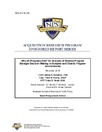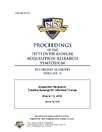Why do Programs Fail? An Analysis of Defense Program Manager Decision Making in Complex and Chaotic Program Environments
| dc.contributor.advisor | Mortlock, Robert F. | |
| dc.contributor.author | Duong, Thien | |
| dc.contributor.author | Donahue, James | |
| dc.contributor.author | Ameh, Friday | |
| dc.date | 12/26/18 | |
| dc.date.accessioned | 2019-04-09T23:03:05Z | |
| dc.date.available | 2019-04-09T23:03:05Z | |
| dc.date.issued | 2018-12-26 | |
| dc.identifier.uri | https://hdl.handle.net/10945/61882 | |
| dc.description | ACQUISITION RESEARCH PROGRAM SPONSORED REPORT SERIES | |
| dc.description.abstract | Department of Defense (DoD) program managers’ ability to make effective decisions are critical to a program’s performance. This qualitative study of two DoD program managers shed light into their decision-making processes in complex and chaotic programmatic environments. Additionally, this study specifically focuses on four aggregate categories-—leadership, attitude, bureaucracy, and reputation. These categories have profound influences on the program manager’s ability to process information, make sense of a situation, and make decisions accordingly. By understanding how program managers perceive reality when facing challenges, we could potentially introduce necessary changes, adopt proven practices, and redirect resources toward efforts that would help program managers make more effective decisions. | |
| dc.description.sponsorship | Naval Postgraduate School Acquisition Research Program | en_US |
| dc.format.extent | 86 p. | |
| dc.publisher | Monterey, California. Naval Postgraduate School | en_US |
| dc.rights | This publication is a work of the U.S. Government as defined in Title 17, United States Code, Section 101. Copyright protection is not available for this work in the United States. | en_US |
| dc.title | Why do Programs Fail? An Analysis of Defense Program Manager Decision Making in Complex and Chaotic Program Environments | en_US |
| dc.type | Report | en_US |
| dc.contributor.corporate | Naval Postgraduate School (U.S.) | |
| dc.identifier.npsreport | NPS-PM-19-019 |
Files in this item
This item appears in the following Collection(s)
-
Acquisition Research Symposium
-
All Technical Reports Collection
Includes reports from all departments. -
Faculty and Researchers' Publications





